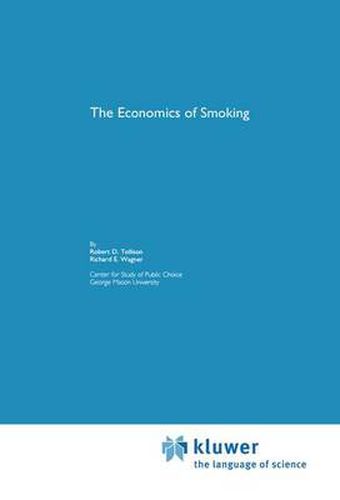Readings Newsletter
Become a Readings Member to make your shopping experience even easier.
Sign in or sign up for free!
You’re not far away from qualifying for FREE standard shipping within Australia
You’ve qualified for FREE standard shipping within Australia
The cart is loading…






This title is printed to order. This book may have been self-published. If so, we cannot guarantee the quality of the content. In the main most books will have gone through the editing process however some may not. We therefore suggest that you be aware of this before ordering this book. If in doubt check either the author or publisher’s details as we are unable to accept any returns unless they are faulty. Please contact us if you have any questions.
Cigarettes are under political attack at all_levels of government in the United States. From Washington, D. C. to state capitals to local govern ments, proposals abound to increase the cigarette excise tax, to impose smoking bans, to prevent cigarette advertising, to restrict the sale of cigarettes through vending machines, to cut off the export of cigarettes, to earmark the cigarette excise tax for health programs, to divest the stock of cigarette companies, and so on. And all of these are purportedly being advocated in the name of health. Undergirding and abetting the health argument is an economic argument that claims to place a value of up to $100 billion per year on the alleged health costs of smoking to the American economy, which is more than $3 per pack of cigarettes smoked. As our title suggests, our interest lies in the economics of smoking and not in the health issues surrounding smoking. We are professional economists and not medical scientists. We will focus on what, if any, economic consequences arise for nonsmokers when smokers smoke. For purposes of our discussion, we simply accept the premise that smoking damages health and proceed with our analysis. Since we have not studied the issue ourselves, we have no way of knowing whether such a premise is true. But it really does not matter for getting the economics of smoking right. The important point resides in who pays for whatever to smoking.
$9.00 standard shipping within Australia
FREE standard shipping within Australia for orders over $100.00
Express & International shipping calculated at checkout
This title is printed to order. This book may have been self-published. If so, we cannot guarantee the quality of the content. In the main most books will have gone through the editing process however some may not. We therefore suggest that you be aware of this before ordering this book. If in doubt check either the author or publisher’s details as we are unable to accept any returns unless they are faulty. Please contact us if you have any questions.
Cigarettes are under political attack at all_levels of government in the United States. From Washington, D. C. to state capitals to local govern ments, proposals abound to increase the cigarette excise tax, to impose smoking bans, to prevent cigarette advertising, to restrict the sale of cigarettes through vending machines, to cut off the export of cigarettes, to earmark the cigarette excise tax for health programs, to divest the stock of cigarette companies, and so on. And all of these are purportedly being advocated in the name of health. Undergirding and abetting the health argument is an economic argument that claims to place a value of up to $100 billion per year on the alleged health costs of smoking to the American economy, which is more than $3 per pack of cigarettes smoked. As our title suggests, our interest lies in the economics of smoking and not in the health issues surrounding smoking. We are professional economists and not medical scientists. We will focus on what, if any, economic consequences arise for nonsmokers when smokers smoke. For purposes of our discussion, we simply accept the premise that smoking damages health and proceed with our analysis. Since we have not studied the issue ourselves, we have no way of knowing whether such a premise is true. But it really does not matter for getting the economics of smoking right. The important point resides in who pays for whatever to smoking.